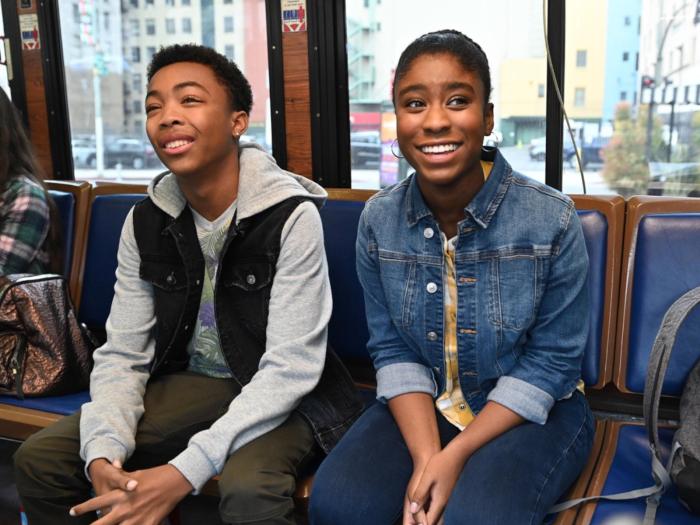

'This Is Us' Thoughtfully Explores the Lines Between Race and Class
By Dustin Rowles | TV | November 6, 2019 |
By Dustin Rowles | TV | November 6, 2019 |

Growing up in Arkansas, I would have my friends drop me off at a nicer house up the street from my own after school events, and I’d run around back and wait for them to drive away before reemerging to walk down to my own house. I was shit poor, and I think that even my friends understood that because the “nice” house in my neighborhood still looked like it could be condemned at any moment. I had a lot of girlfriends growing up, however, who were willing to overlook class issues, and there were a lot of parents of my friends who also saw me for who I was and not for where I lived.
But my girlfriends’ parents? Despite my best efforts, of the ones that would deign to meet me, they uniformly thought I was trash, and it wasn’t just because I was dating their daughter. It was because they chose to see in me the worst of where I came from. I kind of get it now, as a parent. Well, no: Actually, I don’t. It’s bullshit. Would I have reservations about my daughter dating a teenager who has a child of his own? Sure. But I would not dismiss him out of hand, as Randall and Beth do of Malik at the outset in this week’s episode of This Is Us. I’d like to think not.
It was a storyline hit me hard — or harder than most storylines on This Is Us already do. Deja is deeply into Malik, all the more so after skipping school and spending the day exploring Malik’s favorite parts of Philadelphia with him. Once Randall and Beth find out that Deja skipped, however, they invite Malik’s parents over for dinner to discuss their kids’ relationship, which is maybe the least realistic contrivance in all these years of This Is Us. If you have a problem with someone’s kid, you call their parents. Maybe you go knock on their door. But you don’t invite them over for dinner to tell them that you don’t want their kid seeing your daughter anymore, especially with the kid in the room. You don’t invite people over for dinner to tell them to stay away.
Randall and Beth need to think about what that might do to the self-esteem of Malik. At least Omar Epps, who plays Malik’s father, Darnell, is thoughtful enough to do so, standing up for his kid, taking off his shirt to reveal his tattoos, and calling Randall out on his bullshit. “You can choose to see me and my mistakes, or you can choose to see something different,” he says to Randall. “Just like you can choose to see our son as a kid from North Philly, a teenaged father. Or you can choose to see a sweet boy, a straight-A student.”
I appreciate this storyline, because it thoughtfully bifurcates issues of race and socioeconomic class. Randall has struggled with his identity his entire life as the only Black kid in a white family, and this season, since befriending his Black teacher, Young Randall has done an admirable job of calling out Jack’s blind spots when it comes to race. Jack has likewise done a decent job of owning up to those blind spots and working to correct them. But the introduction of Deja — who comes from an impoverished background and a mother with substance abuse problems — has highlighted Randall’s own blind spots when it comes to class. In some ways that says to me that while Jack was listening to his son, Randall failed to pick up on any of the lessons of his father, who was also shunned by Rebecca’s Dad because Jack grew up poor.
It’s been an interesting season, and maybe it’s best, so far, because This Is Us seems confident in itself enough now that it doesn’t have to play up mysteries to keep viewers returning. The writers have put all their faith in the characters, and they’re letting the remarkably consistent performances sell the season’s themes, which are deeper and more substantive, even as This Is Us has managed to maintain its light, sometimes weepy tone. Their issues are not the same, obviously, but I also really appreciate how much Randall has grown up to be like his father: They’re good men, they both have had blind spots, but both have been willing to recognize them and work to be better parents.
← James Dean To Appear in Vietnam War Drama Via CGI | Andy Serkis and Colin Farrell are Being Eyed to Join 'The Batman' →
More Like This
One Of The Stars Of 'The Hangover' Is Joining 'Only Murders In The Building'
A Legendary Horror Franchise Is Headed To Television
Trying To Make it Through the Oscars
Josh Brolin Hosts 'SNL' but Ariana Grande and Scarlett Johansson Steal the Show
One Ruthless Move Saved an Otherwise Uneven Season of 'Traitors'

What’s Old Is New Again: Old Hollywood Glamour Glitters at the 2024 Oscars
Al Pacino Presents Best Picture Oscar, Confuses Everyone
The Dangerous Lie Of 'TradWives'
A Legendary Horror Franchise Is Headed To Television
'The Mandalorian' Season 4 Is Probably Not Happening
Halle Bailey On Why She Chose To Keep Her Pregnancy Private
More Like This
One Of The Stars Of 'The Hangover' Is Joining 'Only Murders In The Building'
A Legendary Horror Franchise Is Headed To Television
Trying To Make it Through the Oscars
Josh Brolin Hosts 'SNL' but Ariana Grande and Scarlett Johansson Steal the Show
One Ruthless Move Saved an Otherwise Uneven Season of 'Traitors'
Reviews